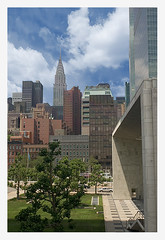What is
Real?
Concerts here and concerts there. From the opera to the theatre and back again. Midway through the fall artistic season, everything begins to blur together. The performances still excite and the resultant ideas still flourish, but lately it all seems like a bit of a slosh through the autumnal mire. Oh, it's beautiful, well-performed, artistic mire, but I, for one, have reached a point where I need a fresh perspective, an emphatic
raison d'etre. What distinguishes this or that production; what elevates one performance from another? What's really at work? Where's its heart? What makes it all
Real?
"Does it hurt?" asked the Rabbit.
"Sometimes," said the Skin Horse, for he was always truthful. "When you are Real you don't mind being hurt."
"Does it happen all at once, like being wound up," he asked, "or bit by bit?"
"It doesn't happen all at once... It takes a long time."
Ouch. The thought ran through my head a few weeks ago when I heard Dawn Upshaw perform at Stanford. Ouch. Are technical difficulties the growing pains of the twenty-first century classical musician? Maybe the old formalities--the performer hushed and composed and in their mental "space" from the instance the lights go up--need a transformation. Be a little rock star, saunter casually onstage,
do a line check (yes, even if you did one an hour ago in the run-through) and fiddle with the knobs on the monitors until everyone is set. It's ok, really. In a piece such as
Ayre, the voice
has to have proper technical assistance if it's going to be electronically mixed and layered against the instrumental ensemble. Ms. Upshaw handled the break in the performance with absolute grace and later joked about the appropriateness of getting "wired" just before the song, "Tancas serradas a muru." She channeled her emotions into the fierce guttural vocalising and cursed everyone in the room, essentially slinging the audience right back into Golijov's musical world.
The song cycle is very much a whole, and as such, forces the singer (and the listener) to "become real" through the entirety of its performance. (This is why the technical interruption so annoyed me.) Sweet folklike simplicity leads to a growling accusatory chant and returns to soothing lullaby. The tenth song, "Yah, annah emtza'cha," is desperate in its plea: spoken text and intense hypnotic chanting represent the present and past, and the re-recorded vocal layerings help create a delicate and disembodied musical rhapsody. But the presence of a very proper, English speaking "other" jerks the listener from a Sephardic and Arab Spain of long ago. In this moment, Golijov exiles everyone--singer and listener, poetic characters and historic peoples. We're cast adrift, confused, and it is painful...but Real. Like the children's story, however, the trials of becoming real make the ending--a typically odd-metered, traditional Sephardic tune--all the more poignant.
Even in the hands of the outstanding Ms. Upshaw and a fiery band of talented musicians (including, at this performance,
eighth blackbird),
Ayre is a complicated piece to pull off in live performance: the concert version needs one more virtuoso, a musically sensitive and technically savvy sound engineer. I attended the concert with the keen-eared
M.C- who concurred that (at least for now) the piece works better in its recorded form. The snags of the live performance, however, reminded me of the Rabbit in the children's story; eyes get plucked out and hair is rubbed off, but in the end, the experience through the piece is visceral and edgy, beautiful and sweet. That's Real enough for me. At the end of the concert, however, in the midst of enthusiastic applause, I overheard an appraisal of a different sort. "Yes, yes, Dawn Upshaw is brilliant...wonderful. She could have had such a career." Then the tone of voice changed, just enough so that I could
hear his odd regretful smile and the shake of his head. "But," he sighed, "she chooses to do things...
like this." What did the Skin Horse tell the Rabbit? Ah yes, sometimes there are "people who don't understand."
continue reading...




